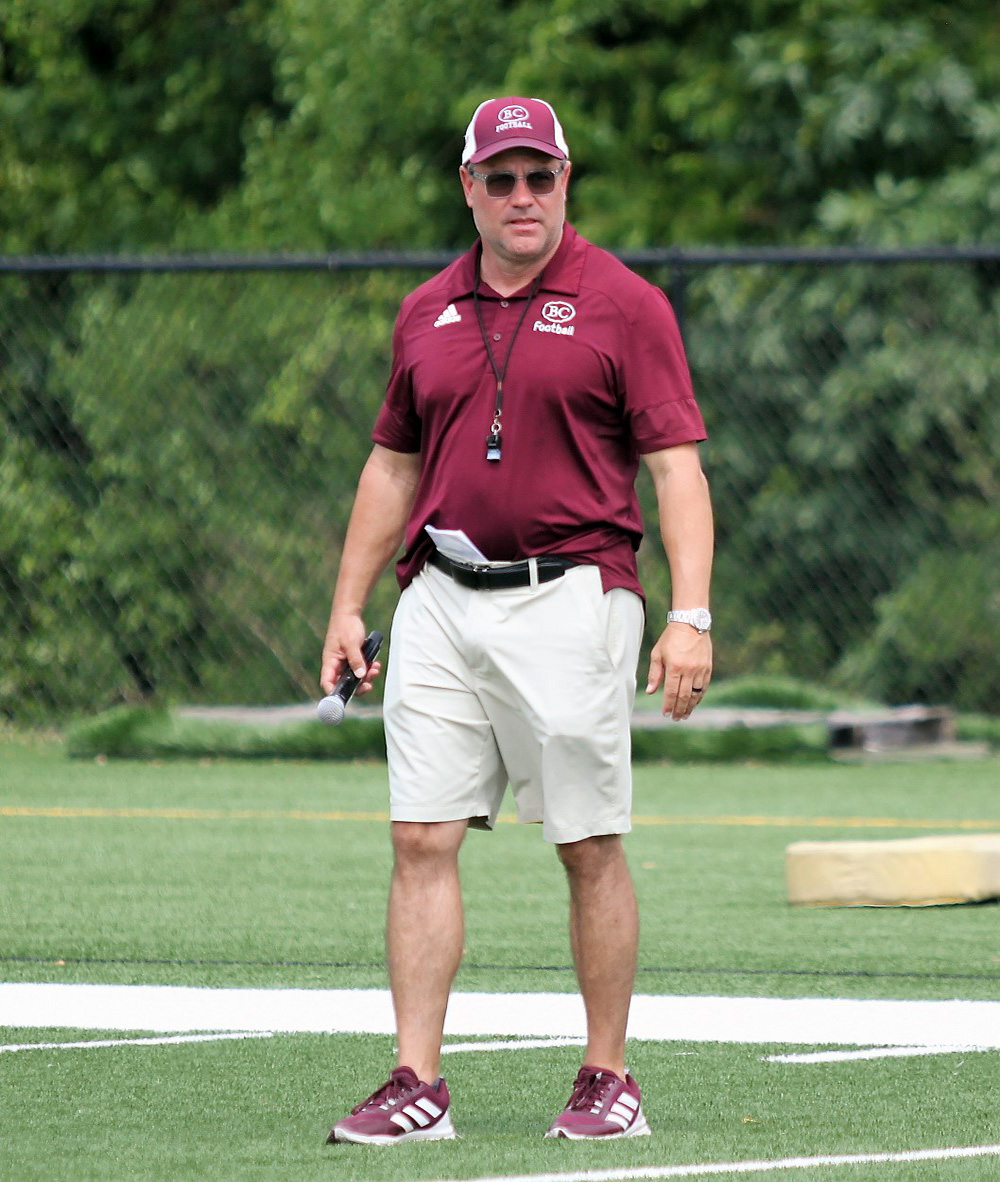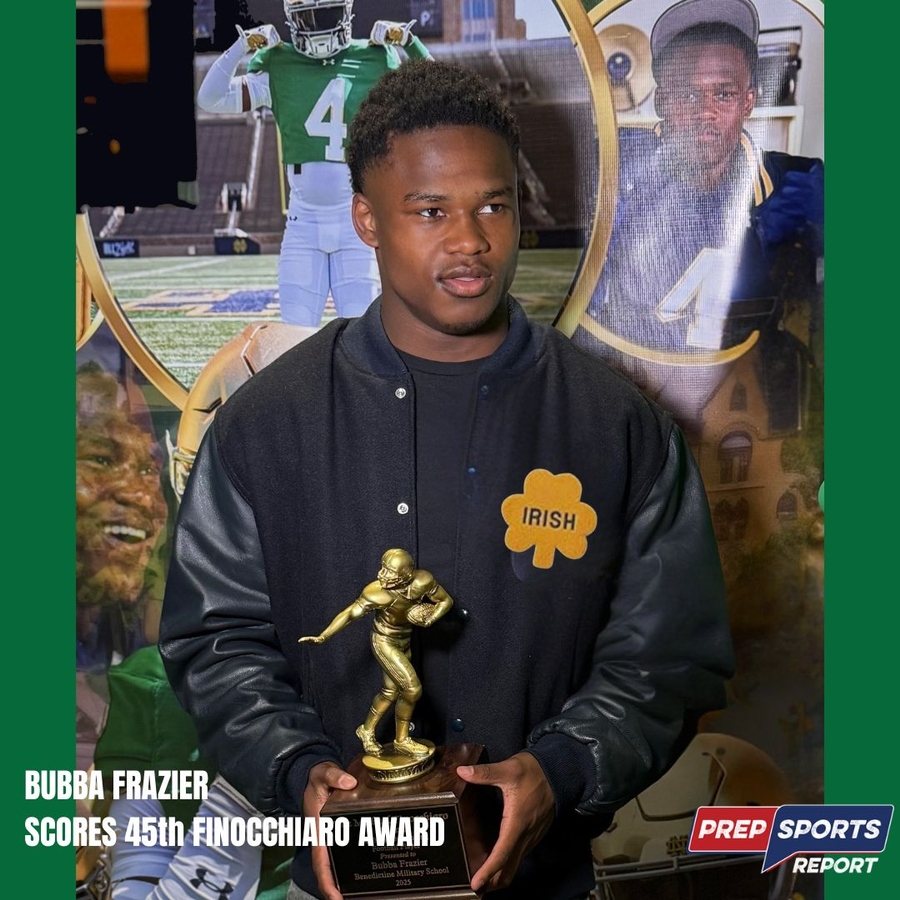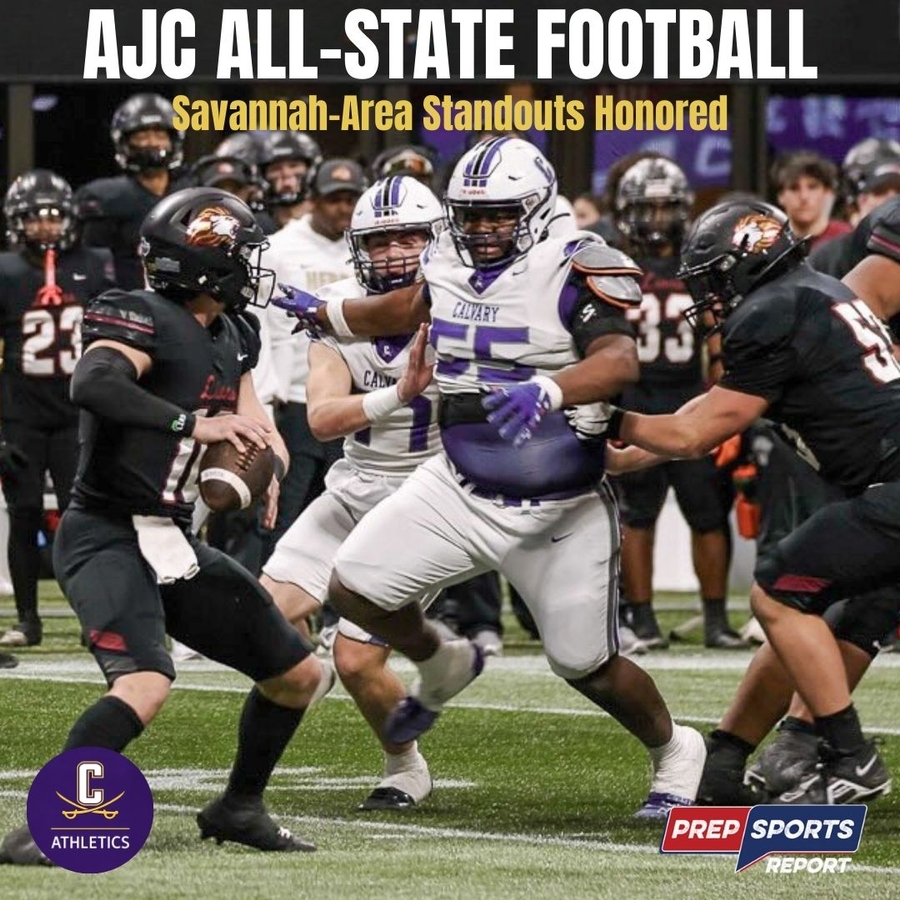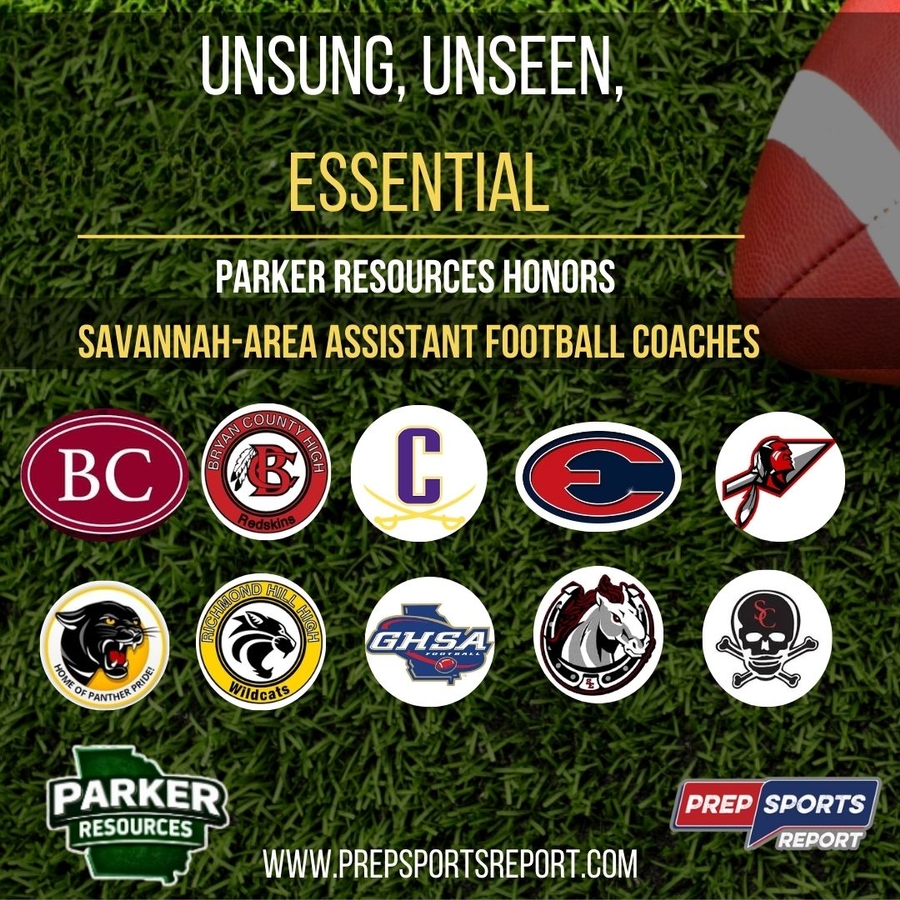Danny Britt, as architect of the Benedictine football program with four state titles since 2014 including the past two seasons, has built a powerhouse strengthened by the Cadets’ successes and failures.
Players buy into the coach and his old-school style – no coddling but pushing them for the betterment of the team and, ultimately, the individual.
Alumni and boosters who were doubtful or indifferent to Britt’s hire in 2011 had to be turned into active supporters. They’ve been rewarded in the years since and turn out in force for the maroon and white.
And Britt, too, evolved as a coach while remaining steadfast with a burning passion.
Not that he saw all of this coming. Britt believed in Benedictine’s potential when he took over the program following a 1-9 campaign in 2010, and he believed in himself.
“When I first got here, I would tell people: Come watch us practice,” Britt, 51,  recalled in a recent interview. “We may win, we may lose. We may win a championship, we may never win another championship. But what I’ve got to be proud of is how we practice, how we teach them, how we prepare them. That’s all you can really do.
recalled in a recent interview. “We may win, we may lose. We may win a championship, we may never win another championship. But what I’ve got to be proud of is how we practice, how we teach them, how we prepare them. That’s all you can really do.
“Coming in with a philosophy and a standard, and building and growing to that standard and philosophy, and then being consistent in it every year, constantly.”
Alijah Alexander, a senior defensive lineman on the GHSA Class 4A state title team, said at the May 24 ring ceremony: “Coach Britt is doing an amazing job. Every year he has a new standard and it changes. Everybody always works to maintain that standard.”
It took time for Britt – in the sports halls of fame at his alma mater Westwood Schools and for Mitchell County in his native Camilla -- to develop his coaching style and philosophy. He sums up the program’s foundation in three words: physical, discipline and intelligent.
Britt is 133-28 at Benedictine with state crowns in 2014 and 2016 in Class 2A, and 2021 and 2022 in 4A, but his head coaching career wasn’t an overnight success. In his first season in charge, Britt went 3-7 at Calvary Day School in 2001.
He was 29 and also serving as Calvary’s middle school principal. Five seasons later, with a 32-22 record, he stepped down as head coach. He focused on his administrative role and his family – his wife Stephanie, their two young daughters Southern and Saylor, and Calvary graduate Demarcus Dobbs, who had moved in with the Britts as a student and was a freshman on the Georgia football team in 2006.
“I wasn’t quite ready (to be a head coach). There were a lot of things I hadn’t really learned yet,” Britt said.
“The two years I took off, I really studied myself as a leader. That second year, I started saying I’ll get back into coaching eventually,” added Britt, who earned a master’s degree in administration and contemplated becoming a headmaster someday. “I really studied a lot of football programs, what I wanted to do as a coach and how I wanted to lead a program when I got the opportunity.”
Missing coaching and the camaraderie as well as leading a team, Britt returned to Calvary’s staff as defensive coordinator under Mark Stroud in 2008-10. Then Britt was hired as head coach at Benedictine, where he had no connection as an alumnus or employee, and perhaps that was a point in his favor with the search committee led by principal Deborah Antosca.
“When I first got here, I was having to go to three and four lunches a day, having to convince the alumni what I could do because nobody wanted me,” he said. “They didn’t know me. They just knew that I was an administrator at Calvary and had a fairly good, average record.”
His first Cadets squad went 5-6, ending with a 56-12 first-round playoff loss to perennial power McEachern in the 2011 GHSA Class 5A playoffs.
Benedictine, with Britt’s support as head football coach and (then) athletic director, moved the next school year to the more accurate and logical Class 2A for its 200-something all-boys student population (doubled to account for nonexistent female students in the GHSA’s classification formula applied to all schools, coed or not).
“I think everybody at that point had agreed when I was interviewing here that we could be more successful,” said Britt, who thought the football team should be “very competitive” every year. “One, it’s a military school. You’re going to get the leadership, the ability to lead, the ability to follow, the falling-in-line mentality from the school. It’s a Catholic school, so you’re going to get that discipline that comes from being a Catholic school. Then add the fact that the alumni and there’s so much support around here for BC, I just felt that with the right person in place, a lot of success could happen. Once we got here and had a little bit of success, people started beating down the doors to come.”
Here's more from a wide-ranging interview on May 22, when Britt talked about how Benedictine has built and sustained one of Georgia’s preeminent football programs.
On learning from coaching influences such as Nick Saban, Jim Harbaugh and Tommy Spangler, his defensive coordinator when Britt played safety and linebacker at Georgia Southern (1990-94), but finding his identity:
“What I determined is as a young coach, I knew a certain way I wanted to be, but I didn’t have a true philosophy of the program. … The culture was a big part of it. I had to determine that. It couldn’t be what I pulled from this and this and this. I had to decide how I was going to do it. It had to be me. First of all, kids can tell whether you’re being real or not. You could say whatever, blah, blah, blah, it could be beautiful. It doesn’t matter. Kids can see through you in a second – probably better than adults can. You have to be true to who you are. I started developing that action plan to when I was head coach again.”
On changing the dynamic of his relationship as the head coach with his players when he got to BC:
“Here, in this place, I’m an extremely tough coach. Really hard on the boys, pushing them. What other people would see as mean sometimes. But I am very purposeful about that. I thought with Calvary, I loved the kids. They knew I loved them. I worked hard for them. I think motivated them fine. Where I think I did not do as well is I did not separate myself and make them the best they could be, even if it made them mad.
“Being their buddy, making them happy, making sure the people got the touches they wanted, whatever, was too important to me at the time. With Demarcus (Dobbs’) group, just really, really close to them for obvious reasons. I made the decision I’ll never do that again.
“I don’t want the kids ever when they’re 30 years old and they come back and they’re at a bar somewhere having a drink and talking about the good ol’ days, I don’t want them to ever say, ‘I really liked Coach Britt, but if he’d have pushed us harder, maybe we would have won the championship.’ Nobody at BC is ever going to say that. Demarcus and his group can probably say that.”
On balancing toughness with love for his players:
“That doesn’t mean we’re not close. They know I love them. Hopefully, at least most of them love me. But they know there are things that I’ve got to do that’s just for the betterment of the team – who plays and how much they play, who’s getting the ball. You never make everybody agree. All of that is to determine what makes the team the best, period. That’s how we’ve got to look at it. I can’t let my heart cloud my judgment on that. That doesn’t mean we won’t pour into a kid and love him and help him in any way we can. It will not affect the football. It sounds so crazy because it’s high school football. If we don’t win next year, I’m not going to get fired. It’s not like that. It’s about those kids becoming men.”
On renovating the weight room in 2011 by raising $90,000 over six months after he and Stephanie used the couple’s money to produce a glossy pamphlet explaining the project’s details and importance:
“(The weight room) was horrid. It was a mismatch of stuff. It needed a lot of work. … . Everything I’ve tried to do here is college level, is try to do things just like a small college. So we did that (pamphlet), we pushed it out to people, they started to push it out to BC alumni. … I knew there was that kind of support here. That’s why Stephanie and I put the glossy folder together and spent our own money to put it out there. I didn’t want anything small. No small thinking. Let’s go huge.”
On his coaching staff over the years, including Charlie Jung, who has been with him from the start; Howard Williams, who retired after the 2022 season; current Savannah Christian head coach Baker Woodward; and the late Ken Cooper, a former Division I coach, including as Ole Miss head coach, who also served on BC’s search committee:
“It’s been a really good group. When I first got here, Ken Cooper was here and was an extremely important part of this building process. It would not have happened without him. I learned so much from him. That was another valuable point when I got here that God put him in my life.”
On expectations for his coaching staff:
“The first thing is I look for somebody who’s going to be loyal to us. I do not want ‘yes’ men. I don’t like a ‘yes’ man. I like somebody who will stand up and say, ‘Coach, I don’t like that. I think we can do it a different way.’ (Telling me) individually or in a coaches meeting. Once we step out, it’s one final voice and that’s my voice. I’ll take it, good or bad. If it doesn’t work, it’s on me. If it works, it’s great players and we’ll talk about the coach who made the decision. They know that. That’s the No. 1 thing it has to be. Understand there are going to be certain ways we do things, and if that doesn’t work for them, this probably isn’t the right place.
“The second thing is a desire to learn. Everybody thinks they want to coach, and they think they know until they get there. The best coaches just come in and say, ‘What can I do?’ and they do it and shut up. That was how it was when I started. ‘Yes sir, tell me what to do and I’ll do it.’ Once you’ve gained strength in that, there’s always something else to learn. I believe in coaches coaching different positions. Certainly, if they think they want to be a head coach someday, coach everything.”
On scheduling tougher opponents outside of the region slate, resulting in an 0-2 start in 2021 and 2-2 in 2022 before winning the rest for consecutive titles:
“That definitely makes us better. One, you learn more in defeat than you do in victory – that’s just a fact. Two, you get exposed really quickly when you play people well. You get lured into this false sense of security when you play teams that aren’t good. We learned it a couple of years. We were in regions and you just go win by 50 (points). We would look at the end of the year and be worse. To me, that is horrible. I don’t want to ever do that. I want to get better.”
On BC’s future, including construction of an on-campus stadium and field house, weight room and training room, and scheduling nationally established programs, “maybe getting on a plane and who knows, go to Vegas or New York.”:
“I’ve said for a couple of years, next level, #nextlevel. When we started playing these teams, everybody knew about BC in the area. Certainly everybody understands about BC in the state now and who we are. Benedictine is becoming a name in the Southeast and I want it to become a national name. I want it to be a name when you say it, people go, ‘Oh, yeah, I know them.’ Maybe get us on national television instead of local television, that sort of thing.”
PHOTO CREDIT: Benedictine Communications Director Noell Barnidge
FOLLOW Prep Sports Report on Twitter @PrepSav, Instgram savannahsportsreport, contact PSR at https://prepsportsreport.com/Contact
Optim Orthopedics supports Benedictine Military School athletics. Benedictine Military School's team doctor is Dr. David Sedory. Remember, Optim Orthopedics gets you back into the game.
)-2.jpg)





